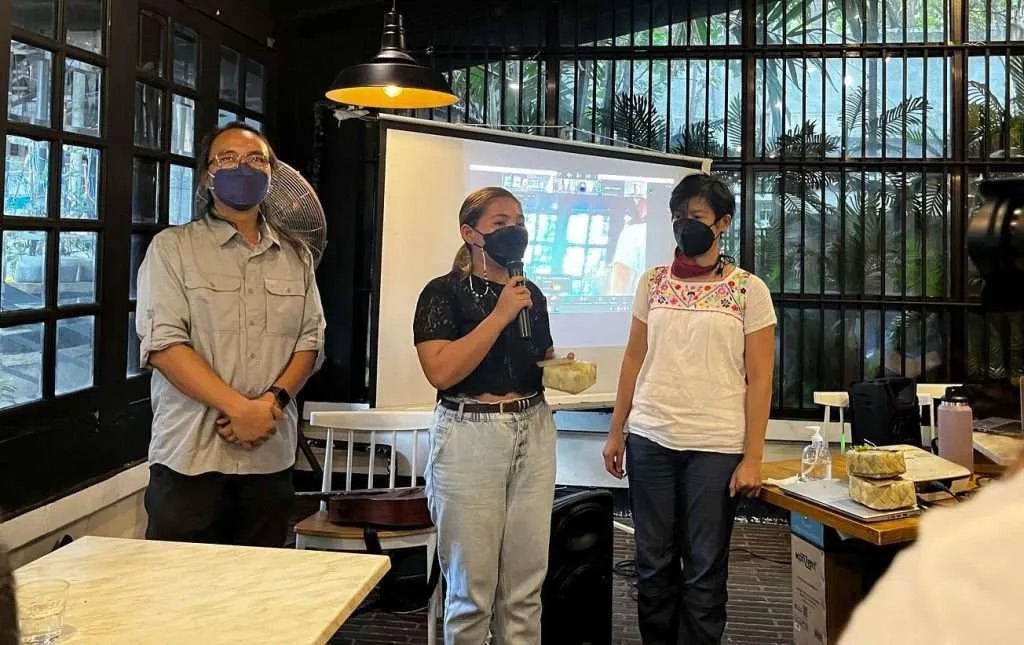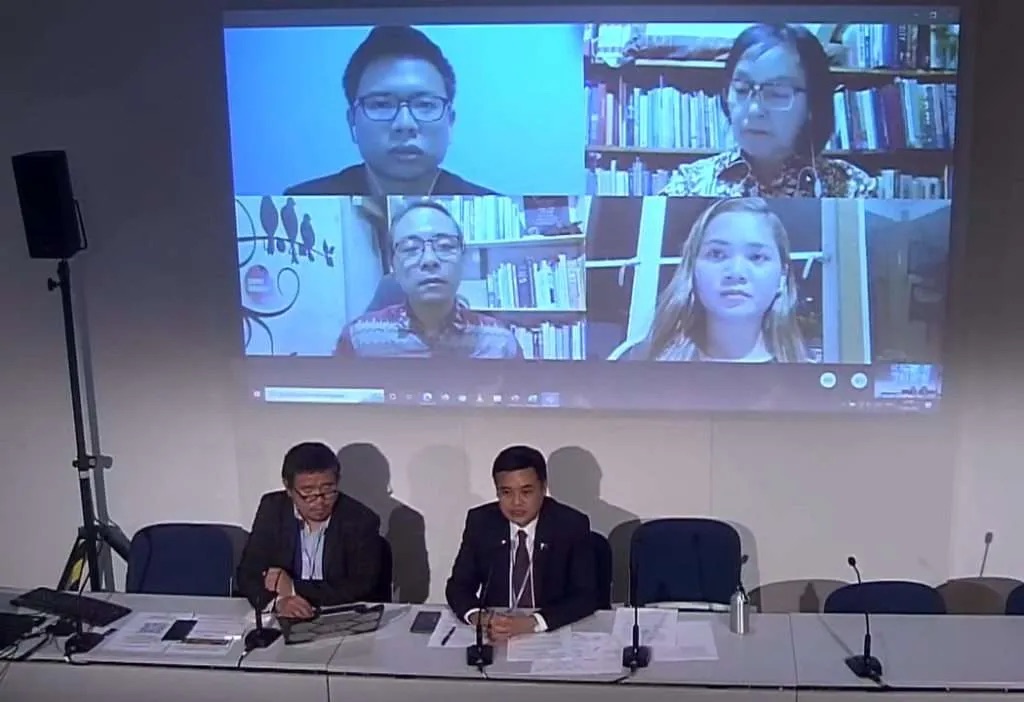In the Philippines, A Human Rights Report Delivers Hope for Climate Justice
6 Mins Read
A 2022 Philippine Commission on Human Rights report links fossil fuel companies to climate change and human rights impacts, boosting climate justice efforts. It calls for stricter regulations, corporate accountability, and reparations for affected communities.
By Elle Guison
“Five years after, my nerves still get the best of me whenever I hear the crash of ocean waves. I get anxious and restless when it rains because I fear that another Haiyan will happen again,” climate activist Marinel Ubaldo recounted during a hearing in New York City in September 2018.
Ubaldo’s experience reflects the devastating impact of climate change on humans. Yet, a common misconception persists that typhoons, floods, heatwaves, and other extreme weather events are simply natural disasters or acts of God.
While the United Nations Framework Convention on Climate Change’s (UNFCCC) definition of climate change emphasizes the influence of human activities, the conversation around accountability for climate-related events remains insufficient.
But on May 6, 2022, a report by the Philippine Commission on Human Rights (CHR) highlighted the role of large fossil fuel companies, often referred to as “carbon majors,” in worsening climate change and strengthened the case for viewing the climate crisis as a human rights issue.
The report on the National Inquiry on Climate Change (NICC) marked the first instance where a national human rights institution directly addressed the link between the operations of carbon majors and climate change’s impacts on human rights.
“That report was deeply personal for me as a typhoon survivor because it validated the experiences of my community and other affected communities,” Ubaldo said in a recent interview with Climate Tracker Asia.
She added that it reinforced her resolve to fight for climate justice and to advocate for the rights of those who have suffered due to climate-induced disasters.
“It was really a powerful affirmation that our voices and experiences matter in the global climate discourse,” Ubaldo said.
Apart from documentary evidence and expert testimonies, the report also represents findings from community dialogues and interviews with fishing communities, farmers, activists, and typhoon survivors.
Two years after the release of the report, non-governmental organizations and individual petitioners like Ubaldo have already seen positive momentum in the climate justice movement.
Developments toward climate justice

Climate activists and NGOs leverage the report’s findings in public statements, policy briefs, and advocacy materials to advocate for stricter regulations and reparations for impacted communities.
Greenpeace Philippines, for instance, acknowledges the report’s role in strengthening the organization’s advocacy efforts as the report establishes a clear discourse on climate accountability.
Greenpeace Philippines climate campaigner Jefferson Chua noted that policymakers are finally taking climate accountability seriously following the release of the report.
“The report gave a face to the thousands of people affected by climate change, highlighting the suffering due to climate impacts,” Chua said.
There is also a growing interest in aligning policies with both the landmark 2015 Paris Agreement and the recommendations of the NICC report.
Some of the report’s recommendations directed to the government include discouraging dependence on fossil fuels, collaborating on innovative climate action, and concretizing the responsibility of businesses, among others.
The NICC report has also spurred action at local levels. Cities Makati City as well as Albay province have declared climate emergencies.
Despite offering solutions and recommendations, the CHR report is not legally binding. This makes it difficult to compel carbon majors and other companies to comply.
The report recommends carbon majors and other carbon-intensive corporations to conduct due diligence, make climate change and human rights impact assessments, be more transparent about their operations and disclose GHG emissions, make public pronouncements about their commitments to combat climate change, stop further exploration of new oil fields, and to contribute to funds that finance the implementation of mitigation and adaptation measures.
“Even after sending copies of the report to their main offices, we received no reaction. They continue to deny their historical role in human rights harms caused by climate impacts,” Chua said.
However, efforts are underway to establish mechanisms that push carbon majors toward climate alignment.
The Low-Carbon Economy Bill proposes a cap-and-trade mechanism to tax companies for exceeding carbon thresholds.
Meanwhile, the Climate Accountability Act (CLIMA) Bill aims to provide a mechanism to secure reparations from major polluters.
“Companies have been avoiding action since the beginning… This highlights the need for laws to compel them to act. While campaigning raises awareness and pressure, policy and legislation are essential to enforce accountability,” Ubaldo said.
While the CHR report offers valuable insights, its technical language can be a barrier to public understanding.
Recognizing this challenge, Chua said that Greenpeace Philippines is actively creating more accessible and engaging content.
Setting a global precedent

The report, being the first of its kind, has also set a global precedent for holding corporations accountable for climate change.
Its findings have been cited in international forums and have been instrumental in pushing countries to make stronger commitments in reducing emissions and supporting vulnerable communities through adaptation strategies as well as loss and damage mechanisms.
In April 2024, the European Court of Human Rights recognized climate change protection as a human right. The ruling stated that governments of European Union member states are now responsible for protecting their citizens from the threats and harms of climate change.
With the binding nature of the European court ruling, Greenpeace Philippines is hopeful of other global developments that would influence and bolster local efforts. One of these developments is climate change litigation reaching the highest court of the United Nations, the International Court of Justice (ICJ).
The ICJ is being asked to draft an advisory opinion on the responsibilities of States concerning climate change. This would enhance accountability by mandating that major greenhouse gas emitters compensate vulnerable nations for the loss and damage caused by climate change, while also protecting fundamental human rights.
While not legally binding, ICJ advisory opinions carry significant “legal weight and moral authority,” shaping the interpretation of international law.
Since a major shortcoming of the CHR report is its lack of legal enforceability, the European court ruling and the potential ICJ advisory opinion are crucial for the Philippines, Ubaldo said. These developments can provide a framework for holding carbon majors accountable and pressing for stronger local policies and actions.
Ubaldo suggested the CHR report could have included more specific recommendations for policymakers and corporations in addressing its findings.
Chua echoed this concern, saying that “while the report calls for fossil fuel companies to phase out, it doesn’t fully address how this transition should be managed justly, especially considering development aggression and human rights harms caused by renewable energy projects.”
Both Chua and Ubaldo encourage communities to speak up and pursue legal claims against polluters. Chua additionally calls for faster passage of legislation like the CLIMA bill to establish binding accountability mechanisms.
“While the Philippines has many idealistic laws, effective implementation and awareness are key to making them impactful. We need to ensure that the partnership between local and national government units continues to support climate justice efforts,” Ubaldo said.
This article by Elle Guison was originally published on Climate Tracker Asia. It is republished here as part of the global journalism collaboration Covering Climate Now.



